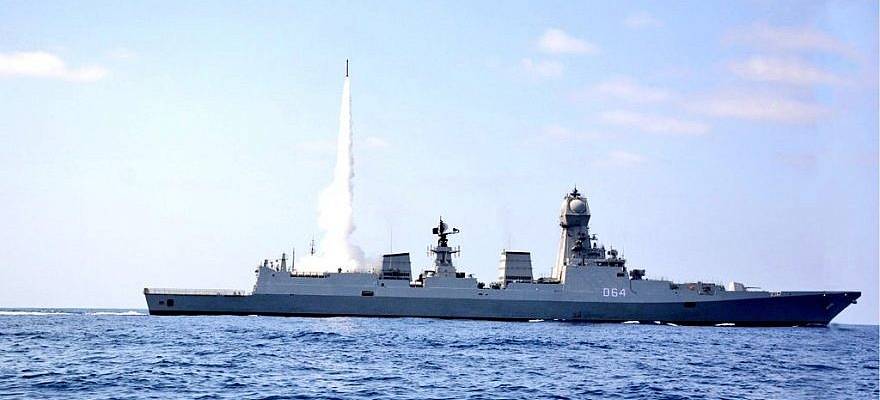The close cooperation between the IDF and defense industries, and Israeli willingness to allow clients to produce Israeli technology, are part of the success.
By Yaakov Lappin, JNS
In recent days, the Indian Navy completed a large-scale exercise in which it successfully tested the Israeli-designed Barak 8 air-defense system.
During the exercise, Indian warships simulated complex threats and ran the Barak 8 system through a number of tests, in which it detected aerial threats and fired missiles at them in time.
Created by Israel Aerospace Industries in cooperation with Rafael, the Barak 8 represents one of the most significant Israeli defense exports in recent years. In 2018, IAI announced a mega-contract worth $777 million for the supply of long-range surface-to-air Barak 8 missile systems to seven Indian warships.
In the previous year, India awarded IAI with a mammoth $1.6 billion contract for the land version of the Barak 8 system.
Such contracts reflect Israel’s major role as an exporter of defense technology and weapons systems to international clients worldwide. The extent of Israel’s defense exports is apparent in annual sales figures.
In April, Israel’s Ministry of Defense announced that defense sales to the international market surpassed $7.5 billion. A defense source told JNS that this figure is considered “a significant success, as it is the second-highest level in the past decade and is reflective of a highly dynamic global market.”
The highest annual figures came in 2017, when Israel sold $9.2 billion worth of defense products. In 2016, the figure was $6.5 billion.
Within Israel’s Ministry of Defense sits the International Defense Cooperation Directorate, known by its Hebrew acronym, SIBAT. This directorate is responsible for building cooperation with existing and potential clients, and formulating Israel’s defense export policies.
Throughout the year, SIBAT and Israeli defense industries have signed dozens of major contracts—work that has contributed to the high figure of Israeli defense exports.
According to the Ministry of Defense’s breakdown of the figures, missiles and air-defense systems, such as the Barak 8 system, represented the largest chunk of sales in 2018 (24%). This was followed by UAV and drone systems (15%); radars and electronic warfare systems (14%); aircraft and avionics (14%); and land systems, ammunition and weapons stations (12%). Further down the list are observation systems (9%); intelligence, information and cyber systems (6%); command, control and communications systems (2%); and satellites and space (1%).
When broken down by region, Asia and the Pacific region lead the way in purchasing Israeli defense goods (46%). This region is followed by Europe (26%), North America (20%), South America (6%) and Africa (2%).
These trends are well-represented in India’s growing use of Israeli defense products, such as the Barak 8, which is also in service in the Israeli Navy.
‘A Sign of Confidence’
Nimrod Sheffer, IAI’s CEO and president, described India last year as “a major market for IAI, and we plan to … reinforce our positioning in India, also in view of increasing competition.”
IAI collaborates with India’s DRDO (Defense Research and Development Organization) and local industries in India to develop the Barak 8.
Such sales trends appear set to continue into 2019.
In late April, Israel’s Globes business newspaper reported that the Indian Army plans to urgently purchase 240 Spike anti-tank missiles and 12 launchers made by Israel’s Rafael Advanced Defense Systems.
And at the start of the year, India purchased another $93 million worth of Barak 8 medium-range naval air-defense systems.
“We have concluded another successful year of Israeli defense exports. Over the past year, we have signed dozens of contracts with various countries around the world,” said Brig. Gen. (Ret.) Mishel Ben-Baruch, SIBAT director, in a statement.
Yiftah Shapir, formerly head of the project on Middle East Military Balance at the Institute for National Security Studies in Tel Aviv, told JNS that Israel enjoys a number of “built-in advantages” when it comes to being a defense exporter.
On the technological level, Shapir said, “the connection in Israel between the user and the developer of defense systems is much closer than in Europe or North America.”
The Israel Defense Forces’ close ties with defense industries make Israel into a cutting-edge laboratory for defense development. In addition, said Shapir, Israel is willing to cooperate with clients and let them produce some of the products on their soil. European and American exporters do not allow that, he added.
Clients such as those in the Asia Pacific region “always think ahead and see how they can develop their own industry and get the technology—technology that others will not give them, but Israeli exporters do,” explained Shapir.
At the same time, he cautioned, the export market is inherently unstable due to the fact that any change of government in any state that imports Israeli defense goods can affect sales. Turkey, which was once a major recipient of Israeli systems, is a case in point, he noted.
In his statement, Brig. Gen. Ben-Baruch, the director of SIBAT, said that “the State of Israel specializes in the enhancement of land, air and naval military systems, and exports some of the most advanced technology in the world.”
He added the high sales figures are “evidence of the desire of more and more countries to cooperate with the State of Israel, and a sign of their confidence in the excellent capabilities of our defense industries.”
Do You Love Israel? Make a Donation - Show Your Support!
Donate to vital charities that help protect Israeli citizens and inspire millions around the world to support Israel too!
Now more than ever, Israel needs your help to fight and win the war -- including on the battlefield of public opinion.
Antisemitism, anti-Israel bias and boycotts are out of control. Israel's enemies are inciting terror and violence against innocent Israelis and Jews around the world. Help us fight back!























